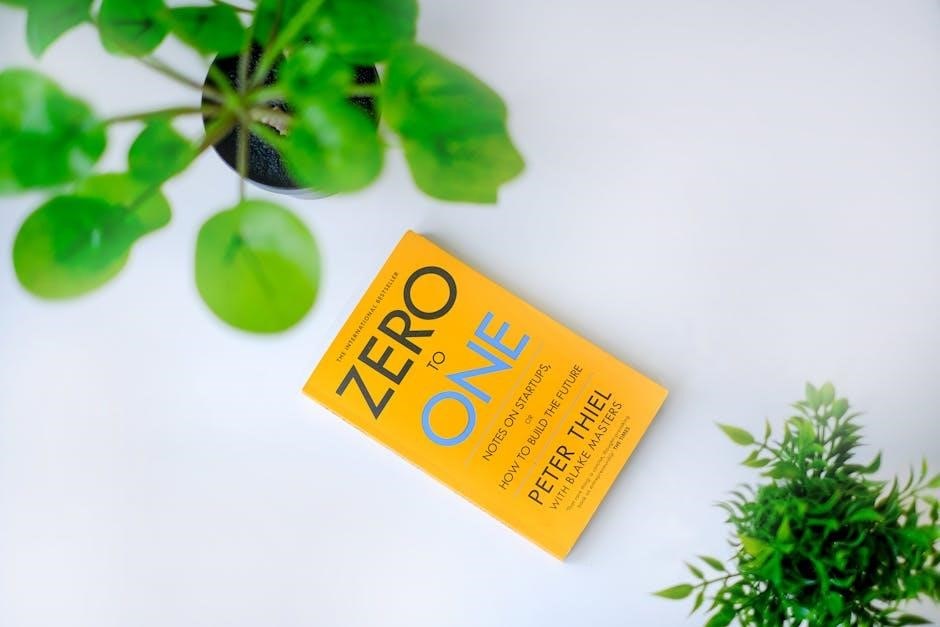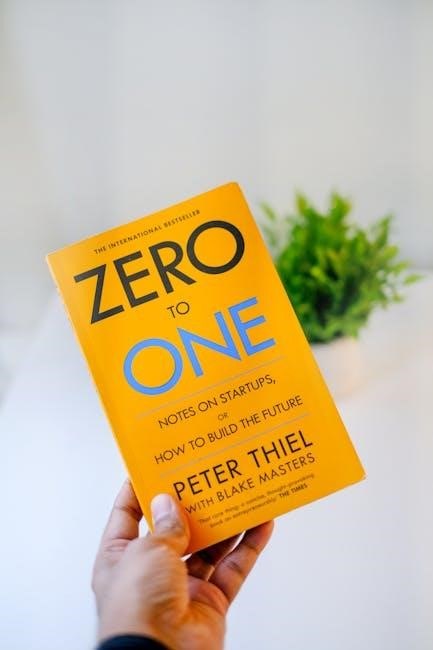Zero to One by Peter Thiel is a groundbreaking guide to building innovative businesses, challenging conventional thinking on progress and offering insights into creating monopolies that drive innovation․
Overview of the Book and Its Significance
Zero to One by Peter Thiel is a 2014 book that explores the principles of entrepreneurship, innovation, and the future of progress․ Based on Thiel’s lectures at Stanford, the book challenges conventional wisdom about business and technology, emphasizing the importance of creating unique value rather than competing in saturated markets․ It introduces concepts like vertical progress and monopolies, arguing that true innovation comes from solving problems others overlook․ The book has become a cornerstone in startup culture, offering practical insights and a contrarian perspective on building the future․
Peter Thiel’s Background and Contributions to Entrepreneurship
Peter Thiel, a visionary entrepreneur and investor, co-founded PayPal, Palantir, and other groundbreaking companies․ A key figure in Silicon Valley, he also backed Facebook and SpaceX, shaping modern tech․ Thiel’s lectures at Stanford inspired Zero to One, offering insights into innovation and monopolies․ His contrarian views and emphasis on vertical progress have influenced startup culture, making him a respected mentor and thinker in entrepreneurship․
Key Concepts in “Zero to One”
Zero to One explores vertical progress, monopolies, and contrarian thinking․ It challenges incremental innovation, advocating for creating entirely new products and industries to drive meaningful change․
The Idea of Vertical Progress vs․ Horizontal Progress
Vertical progress refers to creating entirely new and unique value, moving from “zero to one,” while horizontal progress involves improving existing ideas, going from “one to many․” Thiel argues that true innovation lies in vertical progress, as it solves problems that others haven’t addressed․ He challenges the notion of a technologically advanced society, emphasizing that incremental improvements often mask stagnation․ By focusing on vertical progress, entrepreneurs can unlock breakthroughs, creating monopolies that drive meaningful change and shape the future․ This concept is central to Thiel’s vision for fostering innovation and building transformative businesses․
Why the Future of Innovation is Not in Incremental Improvements
Peter Thiel argues that the future of innovation lies not in incremental improvements but in solving entirely new problems․ While society often focuses on refining existing ideas, this approach limits progress․ Thiel contends that we are in an era of technological stagnation, where true innovation is rare․ Instead of creating “one to many” advancements, entrepreneurs should aim for “zero to one” breakthroughs—pioneering unique solutions to unaddressed challenges․ This contrarian perspective emphasizes the importance of bold, original thinking to drive meaningful progress and create a better future․ Thiel’s vision challenges entrepreneurs to think beyond the ordinary and pursue game-changing ideas․
The Role of Monopolies in Driving Innovation
Peter Thiel challenges the conventional view of monopolies, arguing that they are not inherently bad but can drive innovation when they represent unique value․ A monopoly, according to Thiel, occurs when a company solves a problem that others cannot, creating a competitive advantage․ This uniqueness allows monopolies to focus on long-term goals without immediate competition, fostering groundbreaking advancements․ Thiel emphasizes that true monopolies are built on innovation, not unfair market control, and that entrepreneurs should strive to create products or services so superior that they become indispensable․ This perspective reshapes how we view competition and progress in business․

The Collaboration Between Peter Thiel and Blake Masters
Peter Thiel and Blake Masters collaborated to transform Thiel’s Stanford lectures into Zero to One, blending entrepreneurial insights with Masters’ structured notes, creating a concise guide to innovation․
How the Book Was Developed from Stanford Lectures
Zero to One originated from Peter Thiel’s 2012 Stanford University lectures for the CS183 class on startups․ Blake Masters, a student, captured these insights in detailed notes, which gained popularity online․ Recognizing their value, Thiel and Masters collaborated to expand and refine the content, transforming it into a structured book․ The lectures served as the foundation, offering a roadmap for entrepreneurs to create innovative businesses․ This collaborative process ensured the book retained the essence of Thiel’s teachings while presenting them in an accessible, organized format for a broader audience․
Blake Masters’ Role in Shaping the Content
Blake Masters played a pivotal role in transforming Peter Thiel’s lectures into a cohesive book․ As a student, Masters took detailed notes during Thiel’s Stanford class, which later gained widespread attention online․ His ability to distill complex ideas into clear, actionable insights was instrumental in shaping the book’s structure and tone․ Masters collaborated closely with Thiel to refine the content, ensuring the final product reflected both the depth of Thiel’s vision and the clarity needed for a broad audience․ His contributions were essential in making Zero to One a comprehensive guide for entrepreneurs․

Central Themes of the Book
Zero to One explores creating something new, contrarian thinking, and building the future, urging entrepreneurs to challenge norms and innovate boldly for societal progress․

The Importance of Creating Something New

Zero to One emphasizes the necessity of creating something entirely new rather than copying existing ideas․ Thiel argues that true progress comes from vertical advancements, not incremental improvements․ Entrepreneurs should aim to solve undiscovered problems, creating monopolies that offer unique value․ This approach challenges the belief that competition drives innovation, instead advocating for bold, contrarian thinking․ By focusing on groundbreaking ideas, entrepreneurs can build the future and leave a lasting impact on society․ This mindset is central to Thiel’s vision for fostering innovation and achieving exponential growth․
Contrarian Thinking in Entrepreneurship
Zero to One underscores the power of contrarian thinking in entrepreneurship․ Thiel argues that true innovation arises from questioning conventional wisdom and embracing unpopular ideas․ Entrepreneurs should seek to create unique value by solving problems others overlook․ Rather than competing in crowded markets, they should aim to monopolize untapped opportunities․ This contrarian approach encourages boldness and a willingness to challenge the status quo․ By thinking differently, entrepreneurs can uncover groundbreaking opportunities and create industries that didn’t exist before․ This mindset is crucial for building a better, more innovative future․
Building the Future: A Call to Action for Entrepreneurs
Peter Thiel calls on entrepreneurs to strive for radical breakthroughs rather than incremental improvements․ He urges them to aim for monopolies that solve real problems and create new industries․ Thiel believes that true progress comes from bold vision and contrarian thinking, not from mimicking existing successes․ Entrepreneurs are challenged to think differently, take risks, and build companies that push the boundaries of what’s possible․ This mindset is essential for shaping a future filled with innovation and prosperity, rather than stagnation․ By embracing this philosophy, entrepreneurs can lead the way in creating a better world․

Reception and Impact of “Zero to One”
Zero to One has been widely praised for its fresh perspective on innovation and entrepreneurship․ It has influenced startup culture by encouraging bold, contrarian thinking and monopoly-building strategies․
Reviews and Praise from Prominent Figures
Zero to One has garnered high praise from influential figures․ Elon Musk called it a must-read, while Mark Zuckerberg highlighted its fresh ideas on creating value․ Prominent entrepreneurs and investors have embraced Thiel’s contrarian views, recognizing the book as a seminal work in entrepreneurship․ Its insights on monopolies, innovation, and vertical progress have resonated widely, making it a cornerstone of startup culture․ The book’s influence extends beyond Silicon Valley, inspiring founders worldwide to think boldly about the future․ Its impact is evident in the way it challenges conventional wisdom and sparks meaningful debates about progress and innovation․

How the Book Has Influenced Startup Culture
Zero to One has profoundly shaped startup culture by encouraging entrepreneurs to pursue uniqueness over competition․ Its emphasis on creating monopolies and vertical progress has shifted focus from incremental improvements to groundbreaking innovation․ Founders now prioritize solving undiscovered problems, fostering a mindset of bold creativity․ The book’s contrarian ideas have sparked widespread debate, inspiring entrepreneurs to challenge conventional wisdom and aim for transformative impact․ As a result, Zero to One has become a foundational text, influencing startup strategies and encouraging a new generation of leaders to build the future․
Availability of “Zero to One” in PDF Format
Zero to One by Peter Thiel is widely available in PDF format for download on various platforms, including Archive․org and Bookdio, offering free access to its insightful content․
Where to Find the Book for Free Download
Zero to One by Peter Thiel can be downloaded for free in PDF format from platforms like Archive․org, Bookdio, and various Telegram channels․ These sources provide easy access to the book, allowing readers to explore Thiel’s visionary ideas on entrepreneurship and innovation․ However, ensure you respect copyright laws and opt for legal downloads to support authors and publishers․
Importance of Legal and Ethical Access to the Book
Accessing Zero to One legally and ethically is crucial to support authors and publishers․ While free PDF downloads are widely available, they often violate copyright laws, undermining the value of intellectual property․ Purchasing the book from authorized platforms like Amazon or local bookstores ensures fair compensation for the creators․ Legal access also guarantees a high-quality, unaltered version of the content․ By choosing ethical options, readers contribute to a sustainable ecosystem for authors, publishers, and future literary works․
Critiques and Controversies
Zero to One has sparked debates over Peter Thiel’s views on innovation, with critics arguing his ideas on monopolies and progress are overly narrow or unrealistic for many industries․
Debates Over Thiel’s Views on Innovation and Progress
Peter Thiel’s ideas on innovation and progress in Zero to One have sparked intense debates․ Critics argue that his emphasis on vertical progress and monopolies oversimplifies the complexity of innovation, particularly in industries where collaboration and competition drive advancement․ Some question the practicality of creating monopolies, suggesting it may stifle competition and hinder widespread progress․ Others criticize his dismissal of incremental improvements, arguing that small advancements often lay the groundwork for breakthroughs․ Despite these critiques, Thiel’s contrarian views challenge conventional wisdom, encouraging entrepreneurs to rethink how they approach innovation and the future․
Criticisms of the Book’s Central Arguments
Some critics argue that Peter Thiel’s central arguments in Zero to One oversimplify the complexity of innovation․ His focus on monopolies has been challenged, with critics suggesting that fostering competition and collaboration can drive progress more effectively․ Additionally, Thiel’s dismissal of incremental advancements has been questioned, as many believe small, iterative improvements are essential for sustained innovation․ Others point out that his ideas may not apply universally, particularly to industries outside of tech․ Despite these criticisms, the book remains a provocative and influential work in entrepreneurial circles․